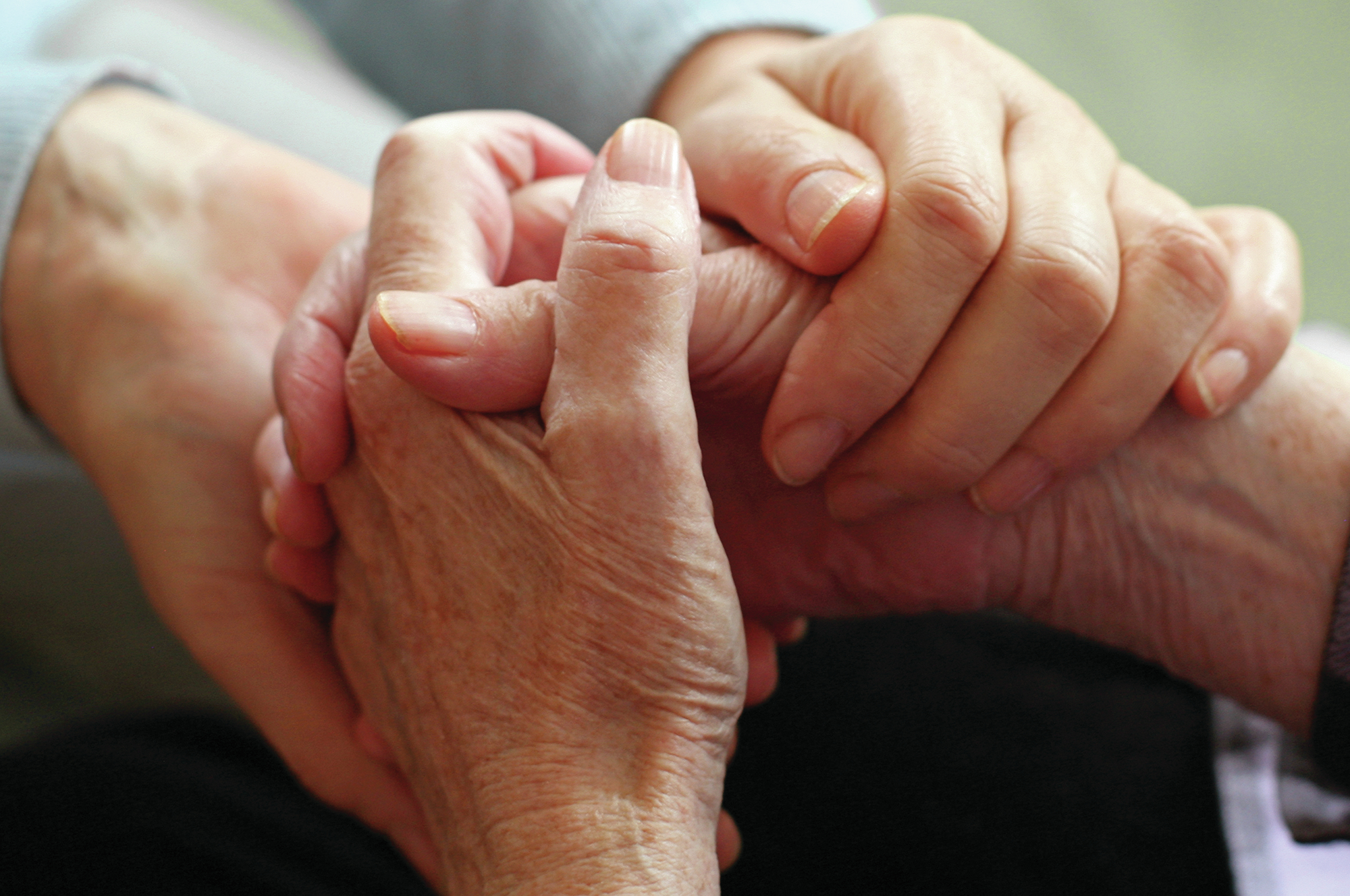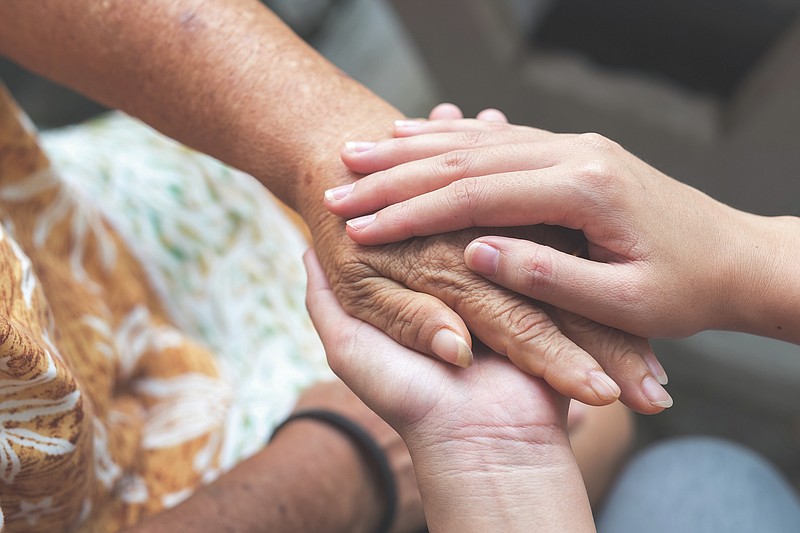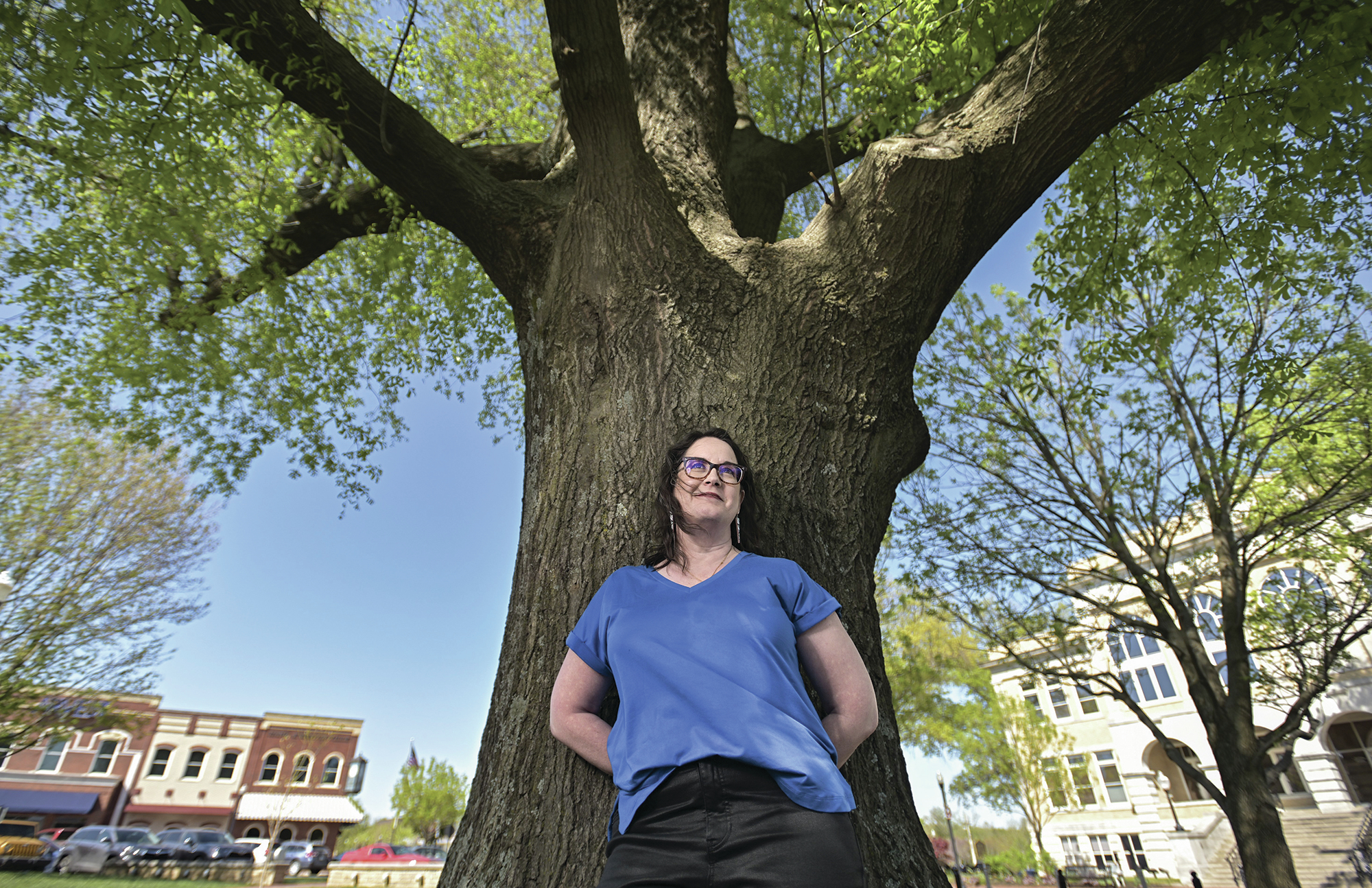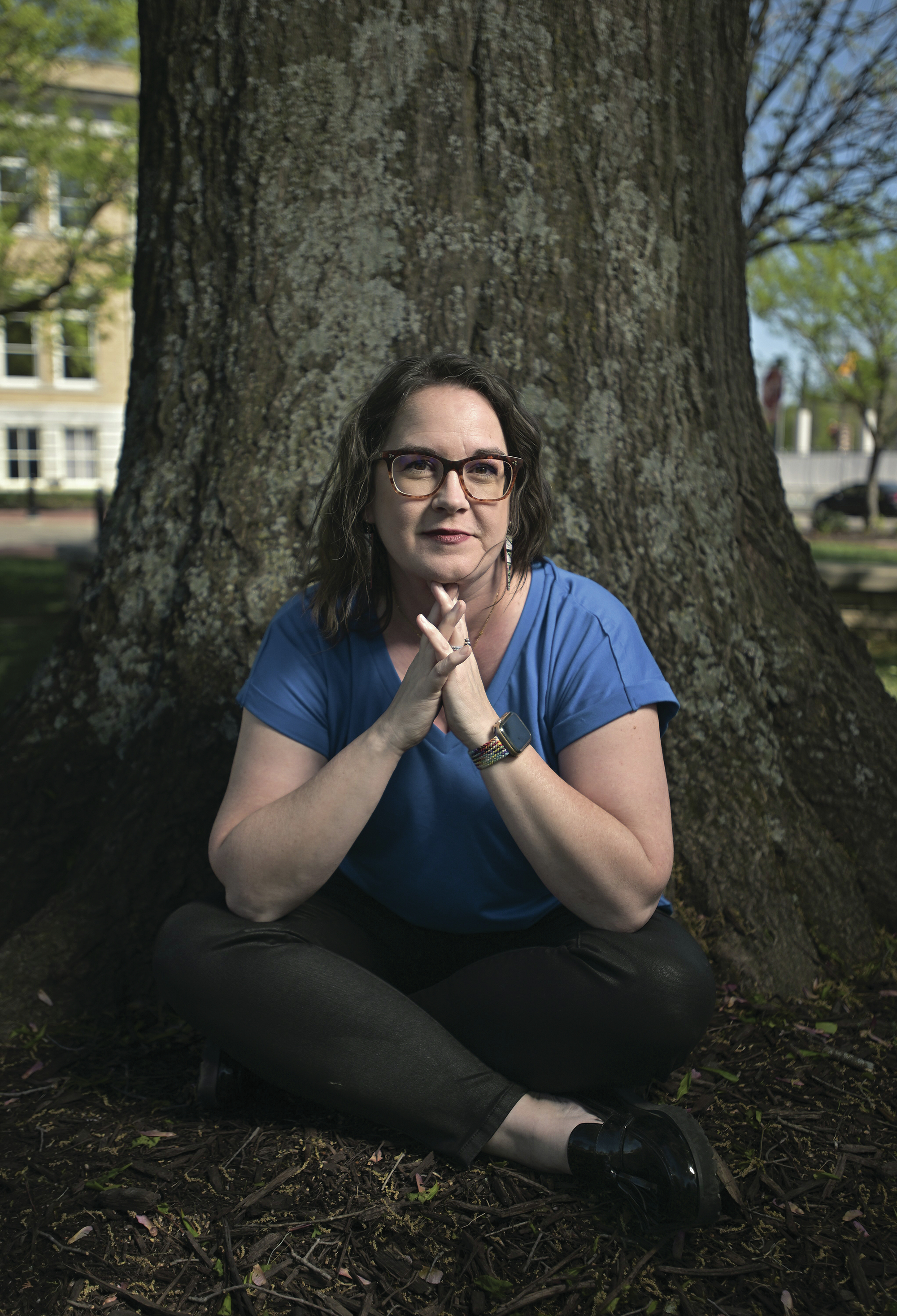Alison Nail-Malone didn't plan on becoming a death doula. The work seemed to find her after her father passed away in 2020 at the height of the covid pandemic.
"I still don't know how it happened," she says. "I didn't talk about it verbally. I kept getting emails about the international doula life movement. ... I didn't know this could even be a profession."
Malone has a successful consulting business, so she wasn't looking for an alternate career. But it began to weigh on her mind that if she were able to help one person navigate the dying process or caretaking of a declining loved one while having to manage parenthood and/or career, it would be worth it. She wanted to help folks with the external processing they need to move forward.
Now, she is one of only two death doulas in the Northwest Arkansas region, according to EverLoved.com.
The National End-of-Life Doula Alliance saw the number of members increase more than three times during the pandemic, going from a couple hundred in 2019 to now listing nearly 700 in its state-by-state directory on its website. Nail-Malone is one of only three options listed in the Arkansas' portion.
After researching a number of certified doula programs, Malone found one that was accessible given her schedule and finances. The certification process in her program was six months, but others can take a year and a half, she says. It included practicum and having case studies.
"I still get chills when I think about it," Malone says. In a moment of working with a man and his two daughters, she thought to herself: "This is what I'm going to do."
It seemed a natural progression. Malone had worked with kids in the past and spent years in human resources with adults. In HR leadership, she was accustomed to talking about things people didn't want to talk about.
Now, with her new work, "there's a different and deeper sense of meaning," she says. "It's helped me take better care of myself and be more present and (realize) what's important to me."
Malone went on to get her accreditation, proving her practicum hours and taking a challenging skills assessment that's designed to set a high standard of ethics.
THE CYCLE OF GRIEF
As a caretaker, Malone had been going through the end-of-life process with her dad for a year before his death. In her experience, there wasn't a lack of information for families in similar situations, nor was there lack of access to that information. The problem was that there wasn't enough time and energy to find it and then process it.
"Thank god Hospice was there to zero in on some of that stuff," she says. "After my dad died, I had the first six months where I didn't really get a chance to grieve because I was closing out everything -- the house, bank accounts, funeral costs, social security and VA."
Malone utilized a grief counseling group through Circle of Life Hospice and learned that she was an "external processor," someone whose healing process is greatly aided by the things that she reads, the workshops she takes and the other resources she finds to feed her brain.
What she realized with time was that thinking of grief in stages was a flawed model. It gives people the impression that there's a solid end to it, she explains. While you might have grown up with an awareness of the five stages of grief, seven stages are more widely accepted now. Malone encourages her clients to think of it as more of a cycle, since it can come back up at any time, even years after the fact.
"We're very driven to have a check mark, because we don't want to deal with (grief)," she says, comparing those stages of grief to a short checklist.
Among the lesser known aspects of grieving is anticipatory grief, when you know that someone's health is declining and that something is getting ready to happen in terms of health events. When Malone's dad was in that stage, there was a six month period where Alison had to contemplate what was might happen. She began to grapple with the possibility of her father's death following that.
"Already I was grieving the relationship, the identity, the impact to my brother and sister," she says.
What's important to handling grief is accepting the knowledge that there's no right or wrong way to grieve, Malone says.
"Some people don't take 'that long' to get over the intensity," she says. "Grief is something always carried with you. It's a never fully healed wound. It has to learn to be assimilated, like putting it in our backpack. And when we stop to notice, we recall a memory through a smell or a mealtime, an anniversary, it comes back up."
That can be a shocking thing to deal with, when 10 or more years after a loved one's death, a fresh wave of grief hits you out of the blue. You might think you're "supposed to be over it," but you can feel it just as strongly as the day that you lost that person, Malone says. It's only natural because grief is an expression of love.
"Well after the death has happened ... (our) closest support system disappears," she says. "We don't want to be a burden as the griever."
It can be helpful, then, to have "someone safe, who understands the language and gives an objective point of view and different (type of) empathy."
WHAT DO DEATH DOULAS DO?
When Malone went through the Hospice experience with her father, they had the aid of a wonderful social worker, she says, but when the two of them hit a phase where they weren't talking to each other, the social worker couldn't do anything about it. Facilitating communication for families who struggle with speaking or speaking civilly to each other is something that death doulas can handle.
"As a doula, I can push that and have action behind it," Malone says. In the case of the father with a couple of adult daughters, he wanted to bridge the gap and see if talking to them again would be a possibility. Alison called each individually, told them their father's desire for conversation and asked if they'd like her to help them with that. One took her up on the offer and the other declined, asking Malone to tell her dad she loved him, but she couldn't talk to him right then.
"It gave him information before his death bed," she says. "It settled something that he couldn't settle on his own because of his family dynamics."
Death doulas perform a number of tasks, the variety and range of which is up to the client. Primarily they are hired to make sure the person's wishes are known and followed, advocating with the medical team, family and community.
These doulas' work is similar to Hospice in that the goal is to make the person dying comfortable, not to keep them from dying. If a person doesn't have their end-of-life documents together, the doula coordinates the legal assistance while acting as liaison between the individual and their family, connecting them all with resources and even finding a place for them to discuss the person's wishes together.
Death doulas sit vigil, create legacy projects for family members, relieve caretakers during an exceptionally stressful time and provide education around the grieving journey.
While many Hospices and other facilities have a "No one dies alone" program, in which volunteers come sit with those who are dying and don't have anyone with them, Malone says those hours are often limited either by constraints of Medicare or by the schedule of the chosen volunteers. Doulas can stay much longer, a comforting fact in the face of an unpredictable event.
Malone has found the creation of legacy projects a particularly special function of her role. Clients want something physical made for their families to hang on to, such as an album or scrapbook, even video albums. One younger client asked her to help write letters for her children to open on various milestones -- a 16th birthday, prom, wedding day -- or when life is shrouded by certain periods and emotions -- when you're feeling lost or unsure, for example.
When working with clients who have dementia, Malone waits for a window of clarity and then asks them questions, recording the answers for family members.
In some instances, a client or their family will meet with Malone only one time to walk through a detailed checklist of major considerations for end-of-life care: setting up Hospice, working with Medicare, finding a state social worker, how to work out something that you're regretting. But the majority use Malone's services for three to six months. Some death doulas are used as companions until their death bed. In the case of dementia patients, that means the doula has had a chance to become a part of their life, become familiar to the person, before sitting vigil with them.
For others, it's the caretaker who needs extra support emotionally, physically and spiritually, Malone says.
When taking care of someone who has an aggressive form of cancer or some other grueling disease, the person has so much to do for their loved one and no time for themselves. Malone and doulas like her can stay with the person who's sick while the caretaker gets out of the house for a little bit.
Some ask for companionship after a death, whether it's because they feel that they're facing an identity crisis, or need help in the early days alone and the many tasks that could be overlooked, or simply want company, someone to do things with, like cooking or creating crafts.
"You don't have to be alone" in processing what's going on, Malone says. "You won't have to think about 'Did I pay the bills?' 'Did I eat?' 'Did I do the laundry?' because you've got someone to help find the resources to do that, while she is who she is and (learning) who she's coming to be.
"We take a look at where you're at and (think about how to) move forward."
__
FYI
Learn more
You can find more resources for the grieving process from Alison Nail-Malone on her YouTube channel, which has most of her digital workshops, https://youtube.com/@AlisonNailMalone or by following her on Instagram @alisonnailmalone.
 Caregiving for aging parents or terminally ill friends or family members, while also navigating work, family and human feelings, is challenging and very difficult to do alone, says Alison Nail-Malone. Thats why she became a certified death doula to help Arkansans through that challenging time. (Courtesy Photo/Shutterstock)
Caregiving for aging parents or terminally ill friends or family members, while also navigating work, family and human feelings, is challenging and very difficult to do alone, says Alison Nail-Malone. Thats why she became a certified death doula to help Arkansans through that challenging time. (Courtesy Photo/Shutterstock) Caregiving for aging parents or terminally ill friends or family members, while also navigating work, family and human feelings, is challenging and very difficult to do alone, says Alison Nail-Malone. Thats why she became a certified death doula to help Arkansans through that challenging time. (Courtesy Photo/Shutterstock)
Caregiving for aging parents or terminally ill friends or family members, while also navigating work, family and human feelings, is challenging and very difficult to do alone, says Alison Nail-Malone. Thats why she became a certified death doula to help Arkansans through that challenging time. (Courtesy Photo/Shutterstock)


